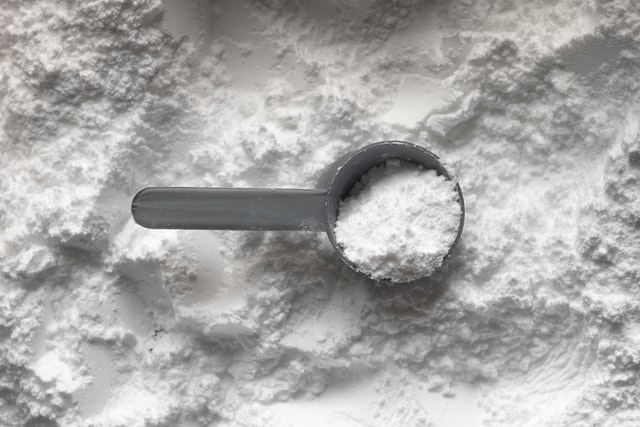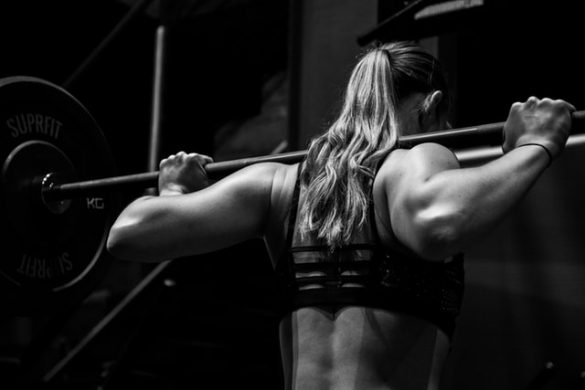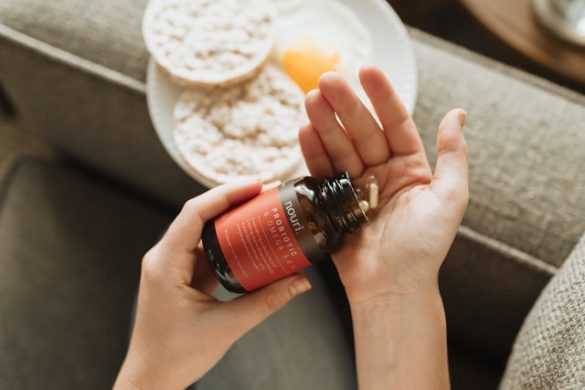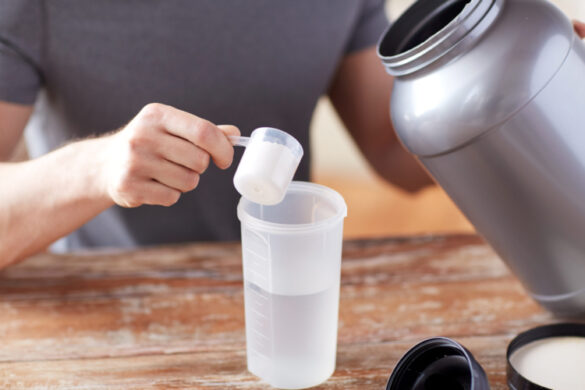What comes into your mind when you hear the word “creatine”? Most people recognize creatine as a supplement men use pre-workout to get muscled up. I am here to tell you that creatine isn’t exclusive for men and is not just a pre-workout supplement. A lot is going on with creatine, especially for women.
That’s why I am here to tell you all about the best creatine for women and who makes them.
Creatine: A Quick Recap
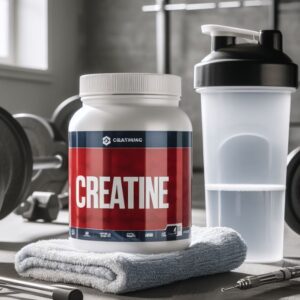
best creatine for women
First, let’s do a quick recap of what creatine is.
Creatine is a chemical found naturally in the cells of the muscles. Amino acids, methionine, glycine, and arginine make up this chemical. Its role in the body is to help the muscles use energy more effectively. Today, you can find creatine as a supplement that improves performance in intense workouts, boost strength, and promote quick recovery from exercise.
In addition, creatine can help you gain muscle and strength when coupled with resistance training. A research study by Abbie E. Smith-Rhyan et al. found that creatine has many potential health benefits for women. It showed that creatine could augment bone mineral density and body composition in postmenopausal women.
Now, seriously, who would not want to try creatine?
Types of Creatine Supplements
1. Micronized Creatine:
- This form of creatine has been mechanically processed to increase its solubility in water, leading to better absorption by the body. Due to its faster absorption, micronized creatine often results in fewer side effects.
2. Creatine Hydrochloride (HCL):
- Creatine hydrochloride is a form where creatine molecules are bonded with hydrochloric acid. This enhances its solubility and absorption rate. Since it’s absorbed faster, it can be administered in lower doses, reducing potential side effects like stomach upsets.
3. Creatine Ethyl Ester:
- This is a form of creatine monohydrate with an ester attached. Esters are organic compounds formed by combining alcohol and carboxylic acids. The addition of the ester increases the amount of creatine absorbed and reduces potential side effects like dehydration and bloating.
4. Liquid Creatine:
- As the name suggests, this is creatine in liquid form. It’s not as popular as the powdered varieties because it tends to degrade over time, whereas powdered creatine remains stable for longer.
5. Buffered Creatine:
- Some manufacturers add alkaline substances to creatine powder to stabilize it in the stomach’s acidic environment. This buffering prevents the muscle pH from dropping during workouts, potentially increasing workout intensity and training volumes.
6. Creatine Magnesium Chelate:
- This form uses magnesium as a binding agent. Magnesium is alkaline, which helps stabilize the creatine in the stomach’s acidic environment. Additionally, magnesium aids in the resynthesis of ATP, further boosting energy production.
7. Creatine Nitrate:
- Derived from creatine combined with nitrate molecules, this form is believed to be more soluble than creatine monohydrate. Nitrates can enhance training duration by reducing oxygen depletion and increasing energy supply to muscles.
8. Creatine Monohydrate:
- The most commonly used type of creatine supplement. It consists of creatine molecules combined with water molecules. When the water molecule is removed, you get creatine anhydrous. Creatine monohydrate can be further processed into micronized form for better solubility. It’s known for increasing water content within muscle cells, leading to muscle growth and improved performance during high-intensity exercises.
Choosing the Right Creatine Supplement
1. Form of Creatine:
- As discussed earlier, there are various forms of creatine available, each with its unique properties. Creatine monohydrate is the most researched and widely used form, but depending on your specific needs and how your body reacts, another type might be more suitable.
2. Third-party Testing:
- It’s crucial to ensure that the creatine supplement you choose has been tested by a third-party laboratory for purity and potency. This ensures that you’re getting a high-quality product without contaminants.
3. Dosage Recommendations:
- Different creatine supplements might have varying dosage recommendations. It’s essential to follow the recommended dosage to avoid potential side effects. Typically, a loading phase of 20g per day for 5-7 days, followed by a maintenance phase of 3-5g per day, is suggested for creatine monohydrate.
4. Price Considerations:
- While it’s essential to get a high-quality product, it’s also crucial to ensure you’re getting good value for your money. Compare prices, but also consider the reputation of the brand, third-party testing, and user reviews.
5. Reading and Understanding Reviews:
- User reviews can provide valuable insights into the effectiveness and potential side effects of a product. Look for patterns in reviews, both positive and negative, to get a comprehensive understanding.
6. Checking for Additives:
- Some creatine supplements might contain additives, fillers, or other ingredients. Always check the ingredient list to ensure you’re not consuming unwanted substances. If you have dietary restrictions or allergies, this step is especially crucial.
7. Purpose of Creatine Supplementation:
- Why are you taking creatine? Is it for muscle growth, improved athletic performance, cognitive benefits, or another reason? Understanding your goals can help you choose the right product and dosage.
8. Dietary Restrictions and Creatine:
- If you follow a specific diet, such as vegan or gluten-free, ensure the creatine supplement aligns with your dietary needs. Some creatine sources might be derived from animal products, so always check the label.
5 Best Creatine Supplements for Women
There is not enough research on creatine to say its benefits are conclusive. However, most research shows positive results on the use of creatine as a supplement. Studies on its effects on women’s health are particularly noteworthy, which is why I’m quite keen on finding out more about it.
With that said, I did my best to find the best creatine for women out of all the numerous supplements available. Below is the list of the creatine supplements I believe are great if you want to try taking creatine.
1. Thorne Research Creatine
One of the things I liked about Thorne Research Creatine is it is perfect for women with dietary restrictions. This is because this creatine does not have any artificial flavors. It also is certified to be free of soy, gluten, and dairy, which means anyone who cannot consume them can take this supplement.
Another thing that made this creatine at the top of my list is that they use a high-quality ingredient. You can tell the ingredient is high-quality, thanks to the fact that all Thorne Research’s products are third-party tested. Their creatine and other products are guaranteed not to have any illegal substances in sports.
There is no confusion when it comes to the ingredients of Thorne Research Creatine. If you look at the product, it is listed there that it only contains 5 grams of creatine monohydrate. It is NSF Certified for Sport, which I would expect from a partner supplement of 11 US Olympic Teams, and manufactured in collaboration with Mayo Clinic.
My only complaint is it’s tasteless since it’s unflavored after all.
2. Genius Creatine
Genius Creatine is a creatine supplement I like because it has other ingredients that contribute to the many benefits it offers. Besides creatine monohydrate, it has beta-alanine, an amino acid for preventing the buildup of lactate in muscles. Beta-alanine helps boost athletic performance, which makes this supplement ideal if you do an intense workout.
There are more ingredients in Genius Creatine, such as AstraGin. It’s a mix of Astragalus membranaceus extract and Panax notoginseng extract. According to AstraGin’s website, this supplement blend can boost your energy levels. It also claims to improve the body’s ability to absorb nutrients.
Genius Creatine also has turmeric, spirulina, and curcumin. These other ingredients provide the supplement’s anti-inflammatory properties. This creatine can also improve exercise recovery and increase your ability to do cardiovascular workouts. If you like a creatine supplement that offers more benefits than creatine, this supplement might work for you.
It comes in a single flavor – sour apple – so it might not be ideal if you want to use the supplement for shakes and smoothies. I also liked that it uses stevia and monk fruit extract as sweeteners. Moreover, it doesn’t contain any fillers or artificial dyes. The company says all products are tested regularly, but the testing is only available upon request.
3. Bad Athletics Creatine for Women
Bad Athletics Creatine for Women claims it can help you build strength and boost your power during exercise. The reviews about this supplement suggest that it works as most who tried it say they feel more energized and have better muscles. I have tried it myself and liked that even though it is flavorless, it is not bad tasting at all.
This supplement uses high-quality micronized creatine monohydrate. It is still creatine monohydrate but in smaller particles. Thanks to the smaller particles, this supplement is much easier to dissolve. The texture of the supplement is a lot smoother, which I particularly like when I drink it with water.
Bad Athletic Creatine for Women does not contain fillers or additives, which work for those with dietary restrictions. It’s non-flavored, so it is okay to add to other drinks. According to the website, this creatine is produced in an FDA Registered Facility and is GMP Compliant. Each container of the Bad Athletic Creatine for Women contains 60 servings of the supplement.
4. Six Star Elite Series Creatine
What makes Six Star Elite Series Creatine different is it comes in pill form. All the other creatine supplements are powdered. This one comes in micronized creatine pills that claim to encapsulate a potent dose of creatine. According to Six Star, this creatine helps the body to generate ATP, a vital source of muscle energy.
Each pill provides more than 3g of a high-quality blend of creatine monohydrate. Six Star Elite Series Creatine is a highly recommended creatine supplement, not only for women but also for men. It has a long list of credentials, from being America’s #1 Selling Bodybuilding Supplement Brand to cGMP Certified.
From my research, athletes and ordinary people alike love this supplement. There are many positive comments about it, such as improving disorders like fibromyalgia and chronic fatigue syndrome. However, some people who do not like to take pills might not enjoy this creatine supplement.
5. MMUSA ATP Femme Creatine
MMUSA ATP Femme Creatine is grape-flavored creatine for women. It’s the creatine supplement I liked the most for its delicious flavor. However, since it is flavored, you can’t add it to your other drinks.
This is a pre-workout supplement containing Creatinol-O-Phosphate, a muscle-building compound that claims to supercharge strength. Its advanced formula also includes Trehalose for recharging the energy stores of the muscle, and Glucosamine Sulfate for the improved structural integrity of the blood vessels, joints, and connective tissues
It also has Eleutherococcus Senticosus Extract, an adaptogen with an anti-inflammatory property that can extend endurance and energy. MMUSA ATP Femme Creatine also has vitamin b12 that should help you have healthy red blood cells.
Combining all these ingredients makes MMUSA ATP Femme Creatine one incredible creatine supplement. However, my research does not tell me anything about others’ experience using it although it is highly-rated creatine.
FAQs on the Best Creatine for Women
1. How soon can I notice the results of taking creatine?
Typically, you can see an increase in muscle mass after a few days of use. According to what people say, you can already feel more pumped just after three or four days of using creatine. Doing a weight lifting program while taking creatine can make the results come quicker.
2. What drinks can I drink creatine with?
Flavored creatine supplements are best dissolved in water. If unflavored, you can mix creatine powder with vegetable or fruit juices. You can also drink it with milk if you prefer.
3. What is the correct dosage?
Scientists are yet to find the best dosage to get the most out of creatine. If you are a non-athlete looking to bulk a little and tone down your muscles, the recommended dose is three to five grams a day for a month.
4. Can I take creatine indefinitely?
We still have a lot to know about the long-term effects of creatine. As such, I recommended that you cycle your use of this supplement. For safety, you should take it for a month and take a break for a while before using it again. It is also recommended to take just about 3 grams of creatine twice a week or every other day after a month’s use.
5. When is it best to take creatine?
It is best to take creatine during training days after your workout. This way, you will not feel nauseous, and the creatine can replenish your lost energy stores. It is also ideal for taking half of the dose pre-workout and the rest post-workout.
My #1 Creatine Recommendation
Out of the five creatine supplements in this list, I highly recommend Thorne Research Creatine as a simple but high-quality supplement. Since it only has creatine as an ingredient, it should familiarize you with all the benefits creatine offers. All the remaining creatine supplements in this list are premium products you can try.
Sources:
https://www.healthline.com/nutrition/what-is-creatine
https://www.healthline.com/nutrition/creatine-for-muscle-and-strength
https://www.healthline.com/nutrition/creatine-for-women
